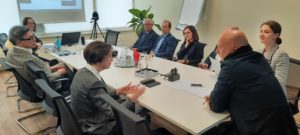
Every spring semester Tony Palmer come to Lithuania to teach Kazimieras Simonavičius University (KSU) Aviation Management students. He is an aviation expert and has a great experience in the industry. “I like sharing my experience, delegating and seeing people grow”, says Tony.
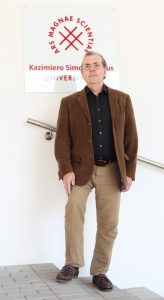
Tony Palmer
Aviation is one of the fastest growing sectors in the world. How do you think, what are the reasons of this growth?
With population growth, increasing disposable income and hence propensity to travel, aviation will continue to grow to fill available infrastructure capacity. You didn’t ask if there are reasons this growth might be constrained and if you had I would say that environmental performance has to improve or growth may be restricted.
How young people may take an advantage of this situation?
There are many ways – travel and see the world or work in the industry. Fares are always going down in real terms – more airlines are striving for lower costs so they can compete so more places become accessible. With a bigger industry there are many roles in and serving the industry so study Aviation or Tourism for example and find a role.
What are the advantages of working in aviation sector?
This depends on the person – for me the industry has been great fun, provided many great experiences. I’ve travelled well and I’ve learned a lot!
Tell us more about your teaching experience. Why do you like teaching? Do you teach only at KSU?
I trained as an Engineer and then worked in Commercial Planning and Airline Strategy – my management style was as a coach. I was a mentor for new graduate entrants. I like sharing my experience, delegating and seeing people grow. As a consultant I delivered commercial training programmes to airlines and I was an interim manager (and coach) when a senior manager was in hospital for a long time. I then started teaching BSc students at my Alma Mata Kingston University, then took on a MSc course in France and now KSU in Vilnius. I have also been an external examiner at another UK University.
Could you tell us more about the most significant projects you did?
I was flight test engineer on Concorde and 747. I was instrumental in getting the licence for the first non-stop flights from the UK to Japan! At British Airways I made some major changes in the flying programme, introduced a concept of ‘Schedule Quality’, was lead in several alliance projects and project managed the introduction of the new crew systems. I was in the start up team for 2 low cost airlines: Hapag-Lloyd Express in Germany and Thompson Fly in the UK.
 How did you interest in kendo? What it means to you?
How did you interest in kendo? What it means to you?
It is a very interesting martial art from Japan, which I took up when I was in my early 20’s – I was looking for a meaningful activity that had discipline and structure and more than a competitive sport. I practice an ‘old school’ I.e. one that pre-dates the modern sport kendo. It’s hard to explain how important Kendo is to me. The principles are about continuous learning and development and luckily no need to stop when you get past the age that competitive sport becomes difficult to sustain.
Do you see any similarities between kendo and aviation?
Like other industries Aviation succeeds when everyone involved seeks continuous improvement – in skills, performance, technology and service. In that way it’s the same. There are always similarities between activities but I wouldn’t go too far with this comparison.
Sometimes people say that aviation is an illness (in a good way, of course!). They say that once it catches you, you fell in love with it for the rest of your life. Do you agree?
There are very few cures and withdrawal symptoms can be severe. That said there are many lessons that Aviation and other industries can share with each other so it’s not necessarily a lifetime career. Life long attraction certainly!
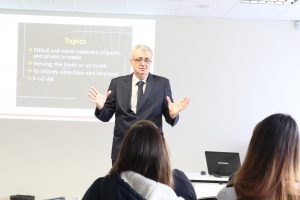
Assoc. Prof. Dr. Sabahudin Hadžialić
Assoc. Prof. Dr. Sabahudin Hadžialić is a professor at the Faculty of Media and Communications of International University Travnik (IUT). In the framework of the Erasmus + mobility, professor held a series of lectures on intercultural communication at KSU. Our conversation spins about communication, different cultures and countries.
What role does the communication itself play in a modern world?
Some politicians, economists and media people would like to say that their profession is the best in the world. What they say is the most common thing and everybody should obey that. The thing is that they forget interdisciplinarity of the meaning. It means that all of them should interact. That is a communication form. Communication means interaction. Interaction means understanding. Understanding means consensualism and consensualism means peace.
How did you take an interest in the intercultural communication?
Intercultural communication is a prerogative. Prerogative that means assumption of precondition of everything. To understand each other, first we have to communicate. Especially if we deal with foreign people, we have to know what intercultural means. Intercultural means that my freedom to communicate will stop on a point when my freedom hurts somebody else. Intercultural communication is a precondition for everything.
What are the most important things we should know when working with people from different culture?
First, we have to ask ourselves some questions like what I would like to accept from them and what I do not want to accept. The future is in mutual understanding, finding consensual formula that we are all humans and we are all red under our skin. I usually say that nation is a part of the history. We just need to wait for the end of the history.
How cultures are divided? Could you give us an example?
There are 10 different points for that: social background, culture, education, tradition, religion, population issue, gender issue, stereotypes, even ecology etc. There is nothing better than differences in the cultures. It unifies us. You and people from other culture may disagree about something. However, when you go back and think about it, you might find some their ideas that might be interesting and they may rethink of something yours. For example, I did my homework and I found the information that people of Lithuania are the less empathic people in the world. It was a research done. However, I found all the people that I met here to be more than that! They are so friendly and open.
Culture itself is a precondition for everything in the society. Do you know that 10 percent of earnings got from bread sales in Sweden are invested into culture? Swedish know that people with developed cultural and media literacy will be developed in a sense of better human beings and they will interact with others. That is the future. That is why I always say that religion must be love within the culture. By that, we will approve ourselves and have interdisciplinary approach.
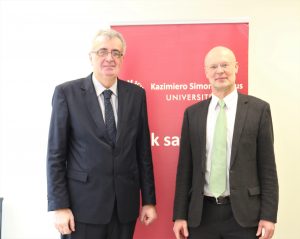
Assoc. Prof. Dr. Sabahudin Hadžialić and KSU Rector Prof. Dr. Arūnas Augustinaitis
Do you have any insights about Lithuanian culture during your visit here?
Yes, it is not my first visit here. When talking with students, I found out that you are so open. I did some research on the streets. I knew some things but I asked if passers-by could help me. Everybody was so helpful and very open! If you said “ačiū” in my country, I would say “bless you”, but in your country it means “thank you”. Those differences between cultures are so inspiring!
Do notice any differences or similarities between people in Lithuania and Bosnia and Hercegovina?
First, I would say that differences by the area does not exist. Despite the fact that we are in the south and have high mountains. You are high on the earth but you are not on the high level above the sea. For example, Sarajevo is about 700 meters above the sea level. It is general in Bosnia, except south part Hercegovina. People in Bosnia and Hercegovina eat less meat than you here. These are just the small differences. Despite that, we are all the same and we are all humans.
The differences between cultures for me are the advantages.
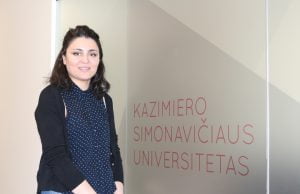
Rusudan Chachanidze
This semester Rusudan Chachanidze who teaches Strategic Management and Financial and Management Accounting at Caucasus University and University of Georgia, is a guest lecturer at Kazimieras Simonavičius University. We talk about the role of Strategic Management in a modern world, the education of Georgia and her impression on Vilnius and KSU.
How did you take an interest in strategic management?
Strategic Management is kind of a subject that has no special faculty for it. Therefore, it takes a lot of different knowledge to combine somehow. Firstly, on my BBA, I used to study marketing, then I switched to Finance and my PhD I am doing is on financial frauds. I had all general knowledge that helped me to go to the strategic management. It requires some knowledge of management, finance and marketing so that is why I decided to combine everything.
Why strategic management is important in a modern world?
Environment is very dynamic right now. Businesses and industries move very fast and change very fast so if you do not have proper tools to plan well, it is very hard to succeed. Although it does not work like you make a plan and it prevents you from changes. Furthermore, strategic management is more focused on being flexible and quickly respond to changes. I think it is a very important skill for each student who will go for having their own businesses or working in a big corporation. This planning skill, having this conceptual view and seeing things in a big picture is a very important capability if you want to succeed in business.
Is strategic management just about business or also public sector?
It is very relevant to both public sector and non-profit sector, so it is not only for businesses. Of course, planning is for everyone and it does not matter what you do, you need to plan things properly.
Do you have any insights about strategic management appliance in Europe and Georgia? Do businesses and governments understand the importance of it?
I think mostly big corporations do that. Every big corporation has its strategic management team and proper planning. Small corporations sometimes do not understand the importance of it. I try to bring to small companies and entrepreneurs the idea that it is important to have strategy even if you are small. I work with cases and I show how each of the theory that I’m teaching them is applied, I show the real life examples of big and small companies and start-ups, so they could see how useful it can be and how these tools are used to actually succeed.
Could you tell us more about Georgia education system? What role do the private universities play in Georgia?
In Georgia, we have many private and public universities. Before the reform, which was started I think in 2005 or 2006, government funding would only go to the public universities. Study quality at public university was not very high but private universities were good. Somehow, the government wanted public universities to keep up with the private ones. Therefore, government started this reform to create intense competition among public and private universities.
The voucher system was introduced. That means that money is given only to a student now. Public universities do not get any funding from government unless they attract students. If public university offers low quality education, students do not go there because they can bring their vouchers and money to private universities. In my opinion that helped a bit. Now we have at least one big public university, which has high quality education. And it is because of the competition. It’s all about student now.
In Lithuania the system is very similar. The difference is just mostly you can bring that public money only to a public university.
Well, it is the most important difference! Public universities has actually compete for money. They had to focus on quality, not only on number of articles or number of professors. Students do not care about that. All they want is to get a proper education and then find a job. Number of articles will not find you a job. That is why they have to increase the quality of education.
Tell us more about the University you came from.
Caucasus University is the university where I started my BBA (Bachelor of Business Administration); actually, this is my home university. It was one of the first private universities in Georgia, which had a very high quality studies and still has a very good reputation. It is a small university. Ant the other one is one of the biggest private universities in Georgia. They both are private and very successful. For example, Caucasus University still has a reputation that graduates of it can overcome any challenge. It is because it was very difficult to study there. I think time that I spent there has really helped me get more confidence and believe in myself, just believe that I can do anything I want. If you can survive 4 years there, you can survive anything! (Laughing)
What about students here in Lithuania and in Georgia? Do you notice any difference between Lithuanian and Georgian students?
Actually, no. Students have the same values and they are friendly. I like your students because they are so welcoming, friendly and very smart students as well. Sometimes after lectures, they invite me to hang out with them and just to be a part of their lives. They took me to the places where they usually go. And I really like being with them! It helps to know the culture better because when you come to a country just for two weeks and you do not have any friends here it is not easy to get into the culture. However, if you have someone who just take you to the places where they go and you get involved in their everyday life you understand the culture better. Everyone is very friendly here!
What is your impression about KSU?
Oh, I like your university very much! First time I visited it last year in summer on a workshop. I liked it so much! Well, I also liked the city. It was summer, sunny all the time. People I met from the administration were very nice. I was very glad to get this offer because I really wanted to come back here. It is so interesting to be here. Now you have this new building and you are growing so I am very glad to see your success.
Will you come back soon here in KSU?
I really hope that. I would like to have a chance to come back here!